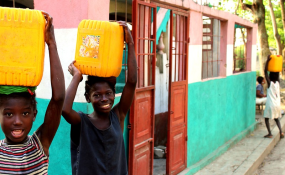 Children carrying water
Children carrying water
Today is World Water Day. With access to water in certain communities limited, Daily Trust looks at the life of children who have to travel long distances to fetch water in containers that weigh as much their body, and the implications of this on their health.
Abdulkareem 13, weighs 31 kg. At different times, daily, he goes to fetch water for the family's use, carrying a 20-litre bucket. When filled to the level he feels comfortable carrying, it weighs 15kg.
For the youngster who lives in an uncompleted building in with his father, stepmother and three siblings at Dawaki Extension of the Federal Capital Territory, he said, "The thing I want the most is to live in a house with running water."
"I am tired of the headache and tiredness I feel fetching water. I know I cannot go to school, but I don't want to spend every day fetching water," he said.
Kilometres away, in the outskirts of the Abuja metropolis, the story is hardly different for the Mohammed siblings.
Saratu Mohammed, nine, is a resident of Paikon Kore, a community of about 10, 000 inhabitants in Gwagwalada Area Council of the Federal capital Territory. She, along with her brothers, Ibrahim, seven, and Kabiru, 11, go to River Eku to fetch water for their family's use.
The strain of the 25-litre repurposed groundnut oil jerrican of water is visible on his neck as Kabiru drags himself up the steep bank of the river as he heads back home. He supports the weight of the container which is about three quarters full, with his hand, while beckoning on the other two to join him.
On school days, it is a chore they carry out from 6.30am for at least 30 minutes before preparing for school. On weekends, they don't make the trips as much because most women, including their mother, go to the river to do their washing.
This routine is scarcely different for a shy 13-year-old girl who was reluctant to share her name or that of her younger sister with our reporter as they emerged from River Eku, where they had gone to fetch water at 7.27am on a Wednesday. It was their third trip that morning.
While crossing the main road, she unwittingly provided an apt picture of the impacts of water scarcity on children. With the bowl full of water splashing all over her, a group of girls dressed in uniforms walked past in the opposite direction to school.
For another one hour 30 minutes while our reporter observed the traffic around River Eku and interacted with community members, she returned twice to fetch water with her sister, carrying the same black 20-litre bowl.
No comments:
Post a Comment
We need your feed back on our topics please